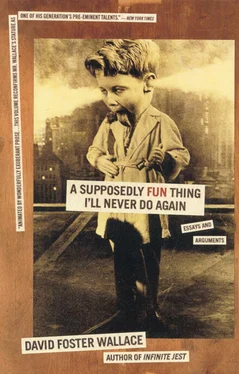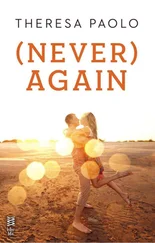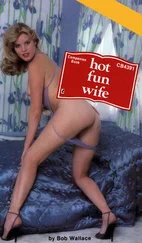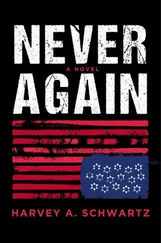For me, Lynch’s movies’ deconstruction of this weird “irony of the banal” has affected the way I see and organize the world. I’ve noted since 1986 that a good 65 % of the people in metropolitan bus terminals between the hours of midnight and 6:00 A.M. tend to qualify as Lynchian figures — flamboyantly unattractive, enfeebled, grotesque, freighted with a woe out of all proportion to evident circumstances. Or we’ve all seen people assume sudden and grotesque facial expressions — e.g. like when receiving shocking news, or biting into something that turns out to be foul, or around small kids for no particular reason other than to be weird — but I’ve determined that a sudden grotesque facial expression won’t qualify as a really Lynchian facial expression unless the expression is held for several moments longer than the circumstances could even possibly warrant, is just held there, fixed and grotesque, until it starts to signify about seventeen different things at once. 11
trivia tidbit
Bill Pullman’s distended and long-held expression of torment as he screams over Patricia Arquette’s body in Lost Highway is nearly identical to the scream-face Jack Nance wears during Eraserhead ’s opening’s conception montage.
9 Lynchianism’s ambit in contemporary movies
In 1995, PBS ran a lavish ten-part documentary called American Cinema whose final episode was devoted to “The Edge of Hollywood” and the increasing influence of young independent filmmakers — the Coens, Jim Jarmusch, Carl Franklin, Q. Tarantino et al. It was not just unfair but bizarre that David Lynch’s name was never once mentioned in the episode, because his influence is all over these directors. The Band-Aid on the neck of Pulp Fictions Marcellus Wallace — unexplained, visually incongruous, and featured prominently in three separate set-ups — is textbook Lynch. So are the long, self-consciously mundane dialogues on pork, foot massages, TV pilots, etc. that punctuate Pulp Fiction ’s violence, a violence whose creepy/comic stylization is also resoundingly Lynchian. The peculiar narrative tone of Tarantino’s films — the thing that makes them seem at once strident and obscure, not-quite-clear in a haunting way — is Lynch’s tone; Lynch invented this tone. It seems to me fair to say that the commercial Hollywood phenomenon that is Mr. Quentin Tarantino would not exist without David Lynch as a touchstone, a set of allusive codes and contexts in the viewer’s deep-brain core. In a way, what Tarantino’s done with the French New Wave and with Lynch is what Pat Boone did with Little Richard and Fats Domino: he’s found (rather ingeniously) a way to take what is ragged and distinctive and menacing about their work and homogenize it, churn it until it’s smooth and cool and hygienic enough for mass consumption. Reservoir Dogs , for example, with its comically banal lunch-chatter, creepily otiose code names, and intrusive soundtrack of campy pop from decades past, is Lynch made commercial, i.e. faster, linearer, and with what was idiosyncratically surreal now made fashionably (i.e. “hiply”) surreal.
In Carl Franklin’s powerful One False Move , the director’s crucial decision to focus only on the faces of witnesses during violent scenes — i.e. to have the violence played out on watching faces, to render its effect as affect — is thoroughgoingly Lynchian. So is the relentless, noir -parodie use of chiaroscuro lighting in the Coens’ Blood Simple and The Hudsucker Proxy and in all Jim Jarmusch’s films, especially Jarmusch’s 1984 Stranger Than Paradise , which, in terms of cinematography, blighted setting, wet-fuse pace, heavy dissolves between scenes, and a Bressonian style of acting that is at once manic and wooden, is all but an homage to Lynch’s early work. Other homages you’ve maybe seen include Gus Van Sant’s use of a quirky superstition about hats on beds as an ironic plot engine in Drugstore Cowboy , Mike Leigh’s use of incongruous parallel plots in Naked , Todd Haynes’s use of a creepy ambient industrial-thrum score in Safe , and Van Sant’s use of surreal dream scenes to develop River Phoenix’s character in My Own Private Idaho . In this same M.O.P Idaho , the German John’s creepy Expressionist lip-synch number, where he uses a hand-held lamp as a microphone, is a more or less explicit reference to Dean Stockwell’s unforgettable lamp-synch scene in Blue Velvet .
Or take the granddaddy of in-your-ribs Blue Velvet references: the scene in Reservoir Dogs where Michael Madsen, dancing to a cheesy ’70s tune, cuts off a hostages ear . This just isn’t subtle at all.
None of this is to say that Lynch himself doesn’t owe debts — to Hitchcock, to Cassavetes, to Bresson and Deren and Wiene. But it is to say that Lynch has in many ways cleared and made arable the contemporary “anti-Hollywood” territory that Tarantino et al. are cash-cropping right now. 12Recall that both The Elephant Man and Blue Velvet came out in the 1980s, that metastatic decade of cable, VCRs, merchandising tie-ins and multinational blockbusters, all the big-money stuff that threatened to empty the American film industry of everything that wasn’t High Concept. Lynch’s moody, creepy, obsessive, unmistakeably personal movies were to High Concept what the first great ’40s noir films were to toothy musicals: unforeseen critical and commercial successes that struck a nerve with audiences and expanded studios’ and distributors’ idea of what would sell. It is to say that we owe Lynch a lot.
And it is also to say that David Lynch, at age 50, is a better, more complex, more interesting director than any of the hip young “rebels” making violently ironic films for New Line and Miramax today. It is particularly to say that — even without considering recent cringers like Four Rooms or From Dusk to Dawn —D. Lynch is an exponentially better filmmaker than Q. Tarantino. For, unlike Tarantino, D. Lynch knows that an act of violence in an American film has, through repetition and desensitization, lost the ability to refer to anything but itself. This is why violence in Lynch’s films, grotesque and coldly stylized and symbolically heavy as it may be, is qualitatively different from Hollywood’s or even anti-Hollywood’s hip cartoon-violence. Lynch’s violence always tries to mean something.
9a a better way to put what i just tried to say
Quentin Tarantino is interested in watching somebody’s ear getting cut off; David Lynch is interested in the ear.
10 re the issue of whether and in what way David Lynch’s movies are “sick”
Pauline Kael has a famous epigram to her 1986 New Yorker review of Blue Velvet she quotes somebody she left the theater behind as saying to a friend “Maybe I’m sick, but I want to see that again.” And Lynch’s movies are indeed — in all sorts of ways, some more interesting than others—“sick.” Some of them are brilliant and unforgettable; others are jejune and incoherent and bad. It’s no wonder that Lynch’s critical reputation over the last decade has looked like an E KG: it’s sometimes hard to tell whether the director’s a genius or an idiot. This is part of his fascination.
If the word sick seems excessive to you, simply substitute the word creepy . Lynch’s movies are inarguably creepy, and a big part of their creepiness is that they seem so personal A kind way to put it is that Lynch seems to be one of these people with unusual access to their own unconscious. A less kind way to put it would be that Lynch’s movies seem to be expressions of certain anxious, obsessive, fetishistic, Oedipally arrested, borderlinish parts of the director’s psyche, expressions presented with very little inhibition or semiotic layering, i.e. presented with something like a child’s ingenuous (and sociopathic) lack of self-consciousness. It’s the psychic intimacy of the work that makes it hard to sort out what you are feeling about one of David Lynch’s movies and what you are feeling about David Lynch. The ad hominem impression one tends to carry away from a Blue Velvet or a Fire Walk with Me is that they’re really powerful movies but that David Lynch is the sort of person you really hope you don’t get stuck next to on a long flight or in line at the DMV or something. In other words a creepy person.
Читать дальше












